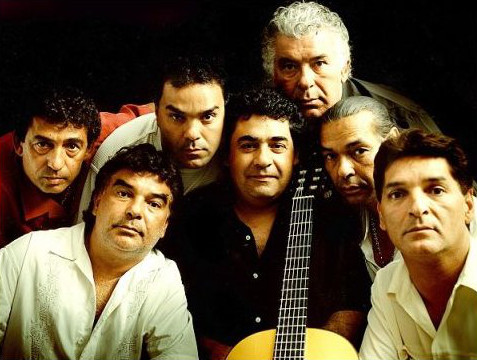| B i o g r a p h y |
 The
Gipsy Kings are a group of musicians from Arles and Montpellier in the
south of France who perform in Spanish with an Andalusian accent.
Although group members were born in France, their parents were mostly
gitanos, Spanish Romani people who fled Catalonia during the 1930s
Spanish Civil War. They are known for bringing rumba catalana, a
pop-oriented music distantly derived from traditional flamenco music, to
worldwide audiences. The group originally called itself Los Reyes.
("The Kings" in Spanish) Their music has a particular rumba flamenca
style, with pop influences; many songs of the Gipsy Kings fit social
dances, such as salsa and rumba. Their music has been described as a
place where "Spanish flamenco and Romani rhapsody meet salsa funk".
The
Gipsy Kings are a group of musicians from Arles and Montpellier in the
south of France who perform in Spanish with an Andalusian accent.
Although group members were born in France, their parents were mostly
gitanos, Spanish Romani people who fled Catalonia during the 1930s
Spanish Civil War. They are known for bringing rumba catalana, a
pop-oriented music distantly derived from traditional flamenco music, to
worldwide audiences. The group originally called itself Los Reyes.
("The Kings" in Spanish) Their music has a particular rumba flamenca
style, with pop influences; many songs of the Gipsy Kings fit social
dances, such as salsa and rumba. Their music has been described as a
place where "Spanish flamenco and Romani rhapsody meet salsa funk".
The Gipsy Kings, born in France but brought up with Spanish culture, are
largely responsible for bringing the sounds of progressive pop-oriented
flamenco to a world-wide audience. The band started out in Arles, a
town in southern France, during the 1970s, when brothers Nicolas and Andre Reyes, the sons of flamenco artist Jose Reyes, teamed up with their cousins Jacques, Maurice and Tonino Baliardo.
Manitas de Plata and Jose Reyes were a duo which had triggered the
wider popularity of Gypsy Rumba. But it was famous singer Reyes who was
mostly responsible for the new surge of popular interest, however, when
he left Manitas de Plata and started a band of his own, made up of his
own sons, which he called "Los Reyes". The band would later become
"Gipsy Kings". Los Reyes started out as a gypsy band. They traveled
around France, playing at weddings, festivals, and in the streets.
Because they lived so much like gypsies, the band adopted the name The
Gipsy Kings. Later, they were hired to add colour to upper-class parties
in such places as St. Tropez. But popularity did not come quickly to
the band and their first two albums attracted little notice. At this
point, the Gipsies played traditional flamenco invigorated by Baliardo's
guitar playing and Nicolas Reyes' exceptional voice. The three
left-handed guitarists in the Gipsy Kings' line-up play guitars that are
strung for right-handers, playing them upside-down. These left-handed
performers focus on delivering the strong underpinning rhythms while the
more complex leads are performed by the right-handed and conventionally
styled Baliardo.
They became popular with their self-titled first album, Gipsy Kings,
which included the songs "Djobi Djoba", "Bamboléo" and the romantic
ballad "Un Amor". The song "Volare" on their fourth album Mosaïque is a
rumba version of Domenico Modugno's Italian hit "Nel blu dipinto di
blu". The Gipsy Kings were popular in Africa and throughout Europe, as
well as in the Middle East. In 1989 Gipsy Kings was released in the
United States and spent 40 weeks on the charts, one of few Spanish
language albums to do so. The band then covered "I've Got No Strings"
for the 1991 Disney video and compilation album Simply Mad About the
Mouse. Their cover version of "Hotel California" was an example of fast
flamenco guitar leads and rhythmic strumming: it was featured in the
Coen Brothers' movie The Big Lebowski as well as on the HBO series
Entourage. The 2010 film Toy Story 3 featured a version of "You've Got a
Friend in Me" performed and recorded by the band; the Spanish language
version was entitled "Hay un Amigo en Mi" and was performed in a more
recognisably flamenco style. The band have been criticised by flamenco
purists, but one of the Reyes family responded by saying the flamenco
world is not in great shape itself and that the band are proud of their
success; the Compas album contains more traditional flamenco music.